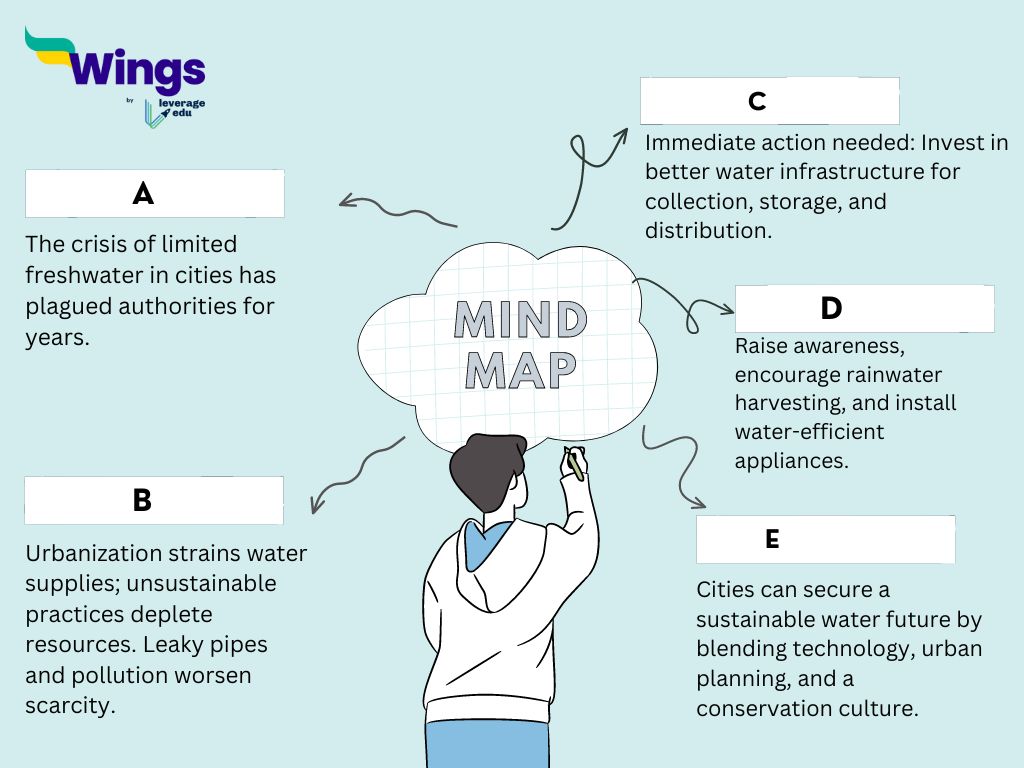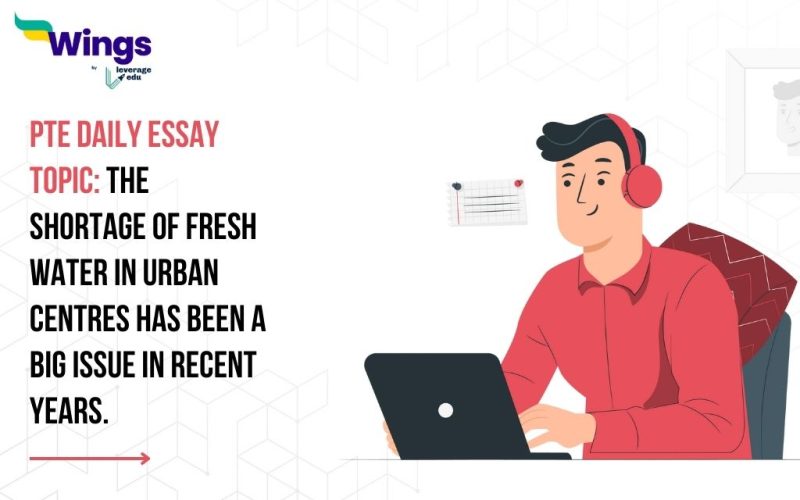Brainstorming Ideas
Refer to the following brainstorming ideas to understand the answer better.
- The crisis of limited freshwater in cities has plagued authorities for years.
- Rapid urbanization strains existing water supplies, while unsustainable practices like groundwater overuse deplete these resources. Leaky pipes and polluted rivers further reduce available water.
- The situation demands immediate action on multiple fronts, some of which are investing in better infrastructure for water collection, storage, and distribution is crucial.
- Promoting water conservation practices among citizens is essential. Public awareness campaigns, encouraging rainwater harvesting, and installing water-efficient appliances in homes can collectively make a substantial difference.
- Employing a combination of technological advancements, responsible urban planning, and fostering a culture of water conservation, cities can ensure a sustainable future with this most precious resource.

Q. The shortage of fresh water in urban centres has been a big issue in recent years. What are the causes leading to this problem and how can we figure it out?
Ans: The crisis of limited freshwater in cities has plagued authorities for years. It’s not mere hype; many urban areas now face a harsh reality – a lack of safe drinking water.
India’s cities are facing a water crisis due to a combination of factors. Rapid urbanization strains existing water supplies, while unsustainable practices like groundwater overuse deplete these resources. Leaky pipes and polluted rivers further reduce available water. This situation is likely to worsen with unpredictable rainfall patterns caused by climate change.
The situation demands immediate action on multiple fronts, some of which are investing in better infrastructure for water collection, storage, and distribution is crucial. Apart from that, leakage detection and rectification in urban pipelines can significantly reduce wastage. Additionally, promoting water conservation practices among citizens is essential. Public awareness campaigns, encouraging rainwater harvesting, and installing water-efficient appliances in homes can collectively make a substantial difference.
Furthermore, exploring alternative water sources like desalination plants for coastal cities and treated wastewater for non-potable purposes needs to be prioritized. Sustainable urban planning that incorporates green spaces and promotes rainwater infiltration can also significantly contribute to a city’s water security. Addressing the challenge of urban water scarcity requires a multi-pronged approach. By employing a combination of technological advancements, responsible urban planning, and fostering a culture of water conservation, cities can ensure a sustainable future with this most precious resource.
To conclude, the lack of readily available freshwater presents a dire threat to the future. Unless we take action now, this crisis has the potential to cause widespread devastation.
Analysis
Paraphrased Statement: The crisis of limited freshwater in cities has plagued authorities for years. It’s not mere hype; many urban areas now face a harsh reality which is a lack of safe drinking water.
Thesis Statement: India’s cities are facing a water crisis due to a combination of factors. Rapid urbanization strains existing water supplies, while unsustainable practices like groundwater overuse deplete these resources. Leaky pipes and polluted rivers further reduce available water. This situation is likely to worsen with unpredictable rainfall patterns caused by climate change.
Body Paragraph 1- Topic Sentence: The situation demands immediate action on multiple fronts, some of which are investing in better infrastructure for water collection, storage, and distribution is crucial. Apart from that, leakage detection and rectification in urban pipelines can significantly reduce wastage.
Body Paragraph 1 Supporting Reasons and Explanations: Additionally, promoting water conservation practices among citizens is essential. Public awareness campaigns, encouraging rainwater harvesting, and installing water-efficient appliances in homes can collectively make a substantial difference.
Body Paragraph 2- Topic Sentence: Exploring alternative water sources like desalination plants for coastal cities and treated wastewater for non-potable purposes needs to be prioritized.
Body Paragraph 2 Supporting Reasons and Explanations: Sustainable urban planning that incorporates green spaces and promotes rainwater infiltration can also significantly contribute to a city’s water security. Addressing the challenge of urban water scarcity requires a multi-pronged approach. By employing a combination of technological advancements, responsible urban planning, and fostering a culture of water conservation, cities can ensure a sustainable future with this most precious resource.
Conclusion: To conclude, the lack of readily available freshwater presents a dire threat to the future. Unless action is taken now, this crisis has the potential to cause widespread devastation.
Vocabulary in Use
| Word | Meanings |
| Plagued | Infestation |
| Urbanisation | Urbanisation is the increase in the proportion of people living in towns and cities. |
| Unsustainable | Not capable of being prolonged or continued |
| Desalination | The process of removing salt from seawater. |
| Multi-pronged | Having or composed of several prongs |
| Fostering | Establishing |
Linkers and Connectors
- Additionally
- Furthermore
- To conclude
Are you preparing for the PTE Exam? Check out the blogs below to bolster your chances of securing better scores in the PTE exam.
| Related Blogs | ||
| PTE Exam Pattern – How to Crack the … | PTE – An Exam That Takes You To Places | PTE Writing Essay-Questions Samples |
| PTE Syllabus – Know It Inside Out | PTE Exam: Everything You Need To Know | PTE Exam Pattern for Academic and General |
Download the Leverage App today.


Need help preparing for PTE? Check out the best PTE preparation courses in the market offered in a live training environment by trusted educators. If you want to help studying abroad, call 1800572130.


 One app for all your study abroad needs
One app for all your study abroad needs












 60,000+ students trusted us with their dreams. Take the first step today!
60,000+ students trusted us with their dreams. Take the first step today!